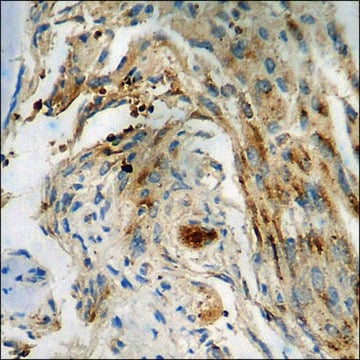C9358
Anti-Chk1 antibody, Mouse monoclonal
~2 mg/mL, clone DCS-310, purified from hybridoma cell culture
Sinónimos:
Anti-CHK1
About This Item
Productos recomendados
biological source
mouse
Quality Level
conjugate
unconjugated
antibody form
purified from hybridoma cell culture
antibody product type
primary antibodies
clone
DCS-310, monoclonal
form
buffered aqueous solution
mol wt
antigen 54 kDa
species reactivity
human
concentration
~2 mg/mL
technique(s)
immunohistochemistry (formalin-fixed, paraffin-embedded sections): suitable
immunoprecipitation (IP): suitable
microarray: suitable
western blot: 1-2 μg/mL using whole extract of cultured 293T (human embryonal kidney) cells
isotype
IgG2b
UniProt accession no.
shipped in
dry ice
storage temp.
−20°C
target post-translational modification
unmodified
Gene Information
human ... CHEK1(1111)
Categorías relacionadas
General description
Immunogen
Application
- immunoprecipitation
- immunohistochemistry
- immunoblotting
Biochem/physiol Actions
Physical form
Disclaimer
¿No encuentra el producto adecuado?
Pruebe nuestro Herramienta de selección de productos.
Storage Class
10 - Combustible liquids
wgk_germany
nwg
flash_point_f
Not applicable
flash_point_c
Not applicable
Certificados de análisis (COA)
Busque Certificados de análisis (COA) introduciendo el número de lote del producto. Los números de lote se encuentran en la etiqueta del producto después de las palabras «Lot» o «Batch»
¿Ya tiene este producto?
Encuentre la documentación para los productos que ha comprado recientemente en la Biblioteca de documentos.
Nuestro equipo de científicos tiene experiencia en todas las áreas de investigación: Ciencias de la vida, Ciencia de los materiales, Síntesis química, Cromatografía, Analítica y muchas otras.
Póngase en contacto con el Servicio técnico








